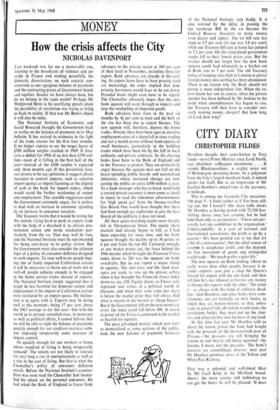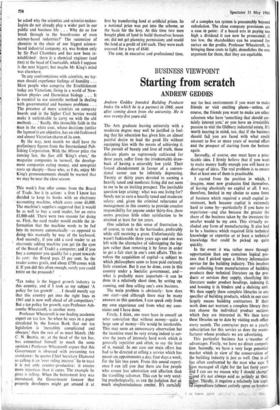CITY DIARY
CHRISTOPHER FILDES
Hambros decuple their contribution to Tory funds—worst Prime Minister since Lord North, says chairman—colleagues unanimous . . . It sounds Rhadamanthine: a mighty voice out of Bishopsgate decreeing doom. As a judgment from the City's largest merchant bank, it indeed speaks for itself. But as an impression of Mr Jocelyn Hambro's annual tour of the accounts, it misleads.
This is among my favourite City occasions. 'On page 5—it looks rather as if I've been sell- ing out, but I haven't' (the share table shows Mr Hambro as having parted with 72,510 five- shilling shares since last autumn, but he had held them only as an executor)-1 have not per- sonally lost any confidence in the organisation.' Understandably : in a year of national and international convulsions, the profit is up by a quarter—It's been pointed out to me that it's a bit of a non-sequitur'; but the chief source of revenee is acceptance credit, and this depends on free movement of goods and unimpeded world trade—'We much prefer a quiet life.'
The new squeeze on Bank lending 'affects us really worse than other people, because it in- cludes exports—you give a chap the Queen's Award for export with the one band, and then tell him he's not allowed to borrow any money to finance his exports with the other.' The point is—as always with this kind of arbitrary dead- line—that Hambros and other banks have com- mitments, not yet formally on their books, to which they are honour-bound; so that, unless trade in general falls off (which would make the restrictions futile), they must put up the shut- ters and refuse further new business of any kind.
At this time last year Mr Hambro told us about the lemon groves the bank had bought with the proceeds of the (nationalised) port of Piraeus—'the peasants are still bringing the lemons in and they're still being squeezed—the lemons, I mean, not the peasants.' The bank's interests are astonishingly diverse: next year Mr Hambro promises news of the Yukon and White Pass Railway.
That was a splendid and well-timed blast by Mr Cecil King in the MinTech broad- sheets: the more science and technology we can get the better he will be pleased. 'It must
be asked why the scientists and scientist-techno- logists do not already play a wider part in our public and business life . . . Why do so few break through to the boardrooms of even science-based industries?' The succession of chemists in the chair of our biggest science- based industrial company, la, was broken only by Sir Paul Chambers and has now been re- established : there is a chemical engineer (and Fits) at the head of Courtaulds, which I suppose is the next biggest; but maybe Mr King's mind was elsewhere.
'In any confrontations with scientists, we lay- men should expetience feelings othumility . . . Most people who comprise the Establishment today are Victorians, living in a world of New- torian physics and Darwinian biology . . . It is essential to use scientific method in dealing With governmental and business problems . . . The presence of more scientists on company boards and in the higher Civil Service would make it unthinkable to carry on with the old methods . . .' Really, this invincible faith in the man in the white coat, whose decisions (unlike the layman's) are objective, has an old-fashioned and almost Victorian charm of its own.
By the way, next month we shall have the preliminary figures from the International Pub- lishing Corporation. With the Mirror price rise Coming late, the Sun still 'King's cross,' the magazine companies in turmoil, the develop- ment companies eating money, and newsprint -costs up sharply—those who, as I do, enjoy Mr • King's pronouncements should be warned that • we may be near the close season.
This week's free offer comes from the Board of Trade. See it in action : a firm I know has decided to keep its books with an electronic ' accounting machine, which costs some £6,000. The machine's suppliers suggested that it would be as well to buy a card reader, for an extra £1,000-odd. There were two reasons for doing so. First, the card reader would enable the in- formation that the machine needs to be fed into its memory automatically—as opposed to doing this manually by way of the keyboard. And secondly, if you add a card reader to an electronic adding machine you get (in the eyes of the Board of Trade) a computer; and if you buy,a computer you qualify for a grant towards its cost : the Board pays 25 per cent. So the reader comes gratis, and about £750 comes with it. If you did this often enough, surely you could retire on the proceeds?
`Tax today is the biggest growth industry in this country, and if I took as my subject 'A policy for tax growth' . . . I should merely say that this country got into the right lines in 1965 and is now well ahead of all competitors.' But a tax policy for growth, says Professor Ash- combe Wheatcroft, is another story.
Professor Wheatcroft is our leading academic expert on tax law. So when he says in a paper circulated by the Ionian Bank that our tax legislation is 'incredibly complicated and obscure,' then the rest of us must blench. (Mr C. N. Beattie, oc. at the head of the tax bar, has committed himself to much the same opinion.) Professor Wheatcroft argues that this Government is obsessed with preventing tax avoidance : he quotes Chief Secretary Diamond as calling it an 'over riding interest.' So to treat it is not only counter-productive: it creates more 'injustices than it cures. The example he gives is telling. When the betterment levy was introduced, the Government foresaw that property developers might get around it at first by transferring land at artificial prices. So a notional price was put into the scheme, as the basis for the levy. At this time two men bought plots of land to build themselves houses on; did not get planning permission; and resold the land at a profit of £40 each. They were each assessed for a levy of £640.
The cost, in executive and professional time, of a complex tax system is presumably beyond calculation. The close company provisions are a case in point: if a board errs in paying too high a dividend it can now be prosecuted; if too low, the shareholders can be assessed for surtax on the profits. Professor Wheatcroft, in bringing these costs to light, demolishes the one argument for them, that they are equitable.







































 Previous page
Previous page